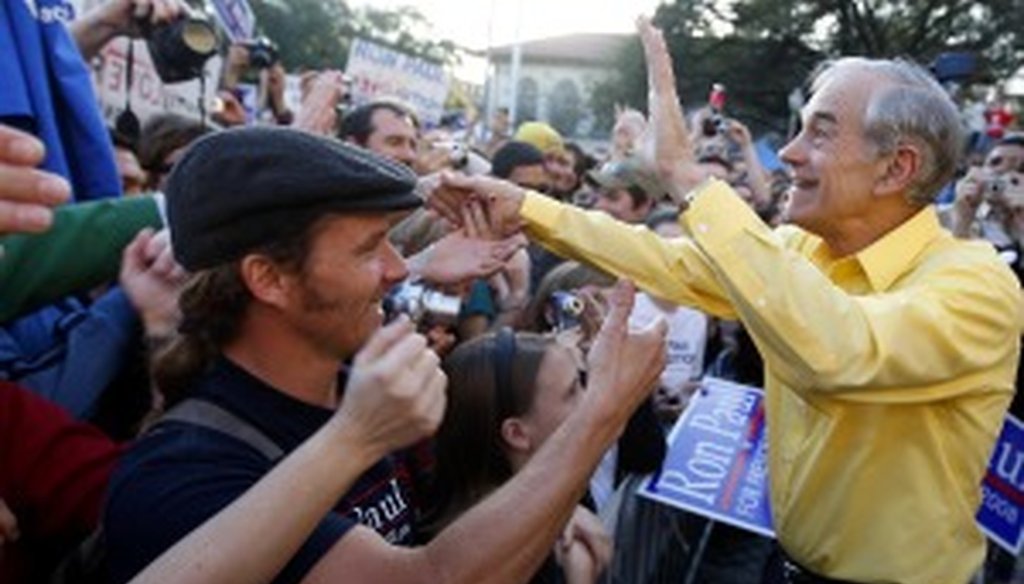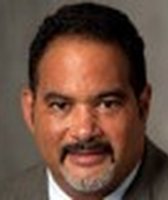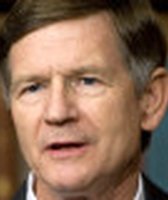Stand up for the facts!
Our only agenda is to publish the truth so you can be an informed participant in democracy.
We need your help.
I would like to contribute

U.S. Rep. Ron Paul greets supporters during his 2008 presidential run.
Ron Paul for President, round three.
The Republican congressman for Lake Jackson announced his plans to form his committee to explore a 2012 presidential run, much like other Republicans who have already organized exploratory efforts, including former Massachusetts Gov. Mitt Romney and former Minnesota Gov. Tim Pawlenty. President Barack Obama also committed to seeking re-election this month.
Paul, 75, was the Libertarian Party’s presidential nominee in 1988, and he ran as a Republican in 2008. Since 2007, when PolitiFact first fact-checked Paul, he’s racked up ratings at every point on the Truth-O-Meter: four True and and four Mostly True ratings, plus a Half True, Barely True, False and Pants on Fire rating. Some highlights follow.
True
During his 2008 presidential run, Paul was the only Republican candidate who opposed the war in Iraq. Still, he correctly claimed that his campaign had received "the most money from active duty officers and military personnel." The Center for Responsive Politics found that from January through October 2007, Paul’s camp received at least $53,670 from U.S. military personnel, and the Houston Chronicle pegged the dollar amount at $63,440.
More recently, during a July CNN interview, Paul talked about the U.S. costs of the war in Afghanistan. "We’re spending $1 trillion a year on foreign policy," he said. How one defines "foreign policy" can change the bottom line, but most calculations bring the country’s foreign policy expenses close to or past the $1 trillion mark.
Mostly True
During a 2007 debate, Paul invoked the founding fathers while criticizing the Iraq War. They "advised non-interventionism" in foreign affairs, he said. President George Washington’s farewell address of 1796 approaches such a point: "The nation which indulges towards another habitual hatred or a habitual fondness is in some degree a slave. It is a slave to its animosity or to its affection, either of which is sufficient to lead it astray from its duty and its interest." However, historians have debated whether the founders’ advice applies to current circumstances, more than 200 years later.
Half True
In a September statement, Paul, said that due to the war in Iraq, "4,400 Americans are dead, 30,000 severely wounded and more than 100,000 are suffering from serious health problems related to post traumatic stress syndrome." We found that more than 4,400 Americans had died and about 30,000 military personnel had been wounded as of September, but Paul's statement that all of them were "severely" injured wasn't supported by Department of Defense data indicating more than half of injured personnel returned to active duty within 72 hours. Also, quantifying how many people were suffering from PTSD proved tricky; none of the counts we found separated Iraq PTSD cases from those tied to duty in Afghanistan.
Barely True
In a January 2010 online column, Paul blasted Washington for mishandling the economy. "We have been on a disastrous course for a long time," he said, adding that "the money supply has doubled in the last year." But that’s not the case according to the measurements most economists use when they talk about the money supply — available money in the economy at any point in time. But Paul’s claim is accurate when looking at how much the monetary base and bank reserves increased, which was significantly, due to explosive growth in the reserves.
False
A 2007 statement on Paul’s campaign website said he "never votes for legislation unless the proposed measure is expressly authorized by the Constitution." But an examination of his record showed that Paul, a physician who has drawn the nickname "Dr. No," went too far in saying "never" — a tough standard to meet in part because he’d already served about two decades in Congress. PolitiFact found six Paul votes for government actions that the Constitution did not "expressly authorize," such as his vote to change federal law governing organ transplants to make it easier for people to receive donated kidneys. One expert speculated that "a hundred other examples" existed.
Pants on Fire
Appearing on MSNBC in January, Paul said that instability in Iraq was forcing religious minorities to flee the country. "Today there was an article, I think, on New York Times — the last Christians are about to leave there," he said. We found a Times article about the last Christian family in an Iraq city considering leaving their hometown. Also, the number of Iraqi Christians has dropped significantly since 2003. But thousands remain in the country. Paul’s statement is not just hyperbole — it’s ridiculous.
Our Sources
Fox News interview with U.S. Rep. Ron Paul, April 25, 2011
See related statements





















































